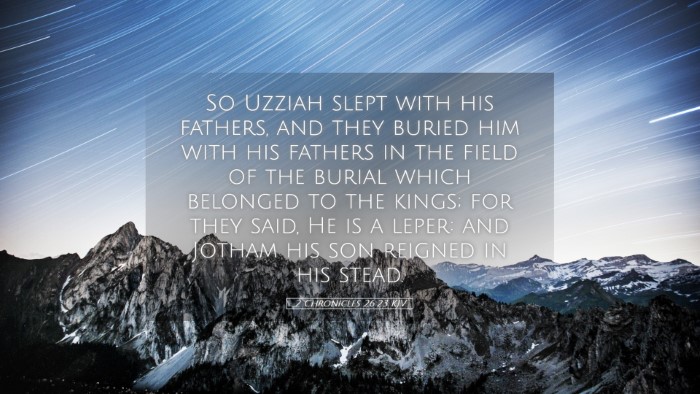Commentary on 2 Chronicles 26:23
Verse Context: The verse in question, 2 Chronicles 26:23, states, "So Uzziah slept with his fathers, and they buried him with his fathers in the field of the burial which belonged to the kings; for they said, He is a leper: and Jotham his son reigned in his stead." This passage marks the conclusion of King Uzziah's reign and serves as a poignant reminder of the nature of his life and eventual downfall.
Overview of Uzziah’s Reign
Uzziah, also known as Azariah, was one of the kings of Judah who notably started his reign with success, characterized by military conquests and ambitious infrastructure projects. His story invites a deeper examination of pride, faithfulness, and divine judgment.
Insights from Matthew Henry
Pride Before the Fall: Henry emphasizes that Uzziah's strength had become his downfall. After attaining success and prosperity, his heart was lifted up to destruction (2 Chronicles 26:16). This reflects a biblical principle that often links pride with subsequent disaster.
The Importance of Humility: Uzziah’s story demonstrates the necessity of humility in leadership. Henry notes the stark contrast between a king who starts with a heart devoted to God and one whose pride leads him to overstep divine boundaries, particularly in assuming priestly roles.
Insights from Albert Barnes
Leprosy as a Metaphor: Barnes mentions that Uzziah's leprosy was not merely a physical ailment but also a symbolic representation of his moral and spiritual corruption. The king who once brought prosperity to Judah now carries a stigma that prevents him from being buried among the kings.
Reflection on Legacy: Barnes reflects on the significance of how Uzziah is remembered. Despite his early successes, the leprosy serves as a lasting reminder of his downfall and failure to honor God. This underscores the importance of enduring faithfulness over short-term achievements.
Insights from Adam Clarke
The Burial of Uzziah: Clarke notes that being buried in the field set apart for the kings reflects a duality in Uzziah's life—he had great accomplishments, yet due to his sin, he could not receive the honor usually bestowed upon monarchs. His leprosy resulted in a life lived in isolation, mirroring the spiritual distance he created from God.
Jotham's Ascension: Clarke highlights the transition of leadership to Jotham, a moment that serves both as a conclusion to Uzziah’s reign and as a beginning for a new era. It is critical for scholars to note that in God’s sovereignty, judgment leads to restoration in the form of new leadership.
Theological Implications
The narrative surrounding Uzziah offers significant theological lessons regarding the nature of kingship, accountability, and the relationship between divine favor and human actions. It invites believers to consider the weight of pride and encourages a reliance on God’s guidance throughout one's life and leadership.
- Understanding Authority: Leaders must recognize their role as stewards of God’s will, acknowledging that authority carries a profound responsibility.
- Consequences of Sin: The story serves as a warning about the consequences of sin and unbelief, showcasing that even those positioned for great purposes can falter without adherence to God's commandments.
- Restoration through Righteous Leadership: The passage signals hope in the future leadership of Jotham, underscoring the importance of righteous governance and the potential for restoration following failure.
Practical Applications
The lessons drawn from Uzziah's reign are varied and rich, applicable in contemporary contexts for pastors and theologians alike:
- Leaders must continually seek humility: Maintaining a posture of humility before God is essential for any leader. Regular introspection and dependence on God’s wisdom should be prioritized.
- Focus on Legacy: Individuals should consider how their actions today will be remembered tomorrow. The balance of achievements and spiritual integrity must be woven into the fabric of one’s life and ministry.
- Importance of Accountability: As witnessed with Uzziah, accountability structures within church leadership must be in place to prevent isolation from God's will.
Conclusion
In conclusion, 2 Chronicles 26:23 serves not only as a historical account but also as a profound theological narrative weaving together themes of pride, judgment, leadership, and repentance. The insights from Matthew Henry, Albert Barnes, and Adam Clarke provide a multifaceted understanding that can enlighten contemporary readers, guiding them in their spiritual walks and leadership roles. The reverberations of Uzziah's story challenge us to strive for a faith that endures beyond our successes and failures, resting in the mercy and sovereignty of God.


